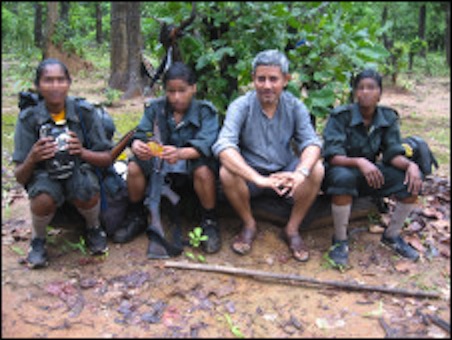During a session on international news reporting at the RadioAsia 2011 Conference in Delhi, BBC Radio’s Suvojit Bagchi told delegates about his three months embedded with Maoist rebel troops and explained the power radio has to get deeper into a story than other media. While troops would not talk on camera for fear of being recognized, they readily talked into Bagchi’s microphone. With radio the pictures are also better, because it is dangerous for a camera to get right into the heart of battle, whereas descriptions and interviews mixed with sound can give a listener much better insight into the heat of the battle. The radio series has just begun airing on BBC Radio in English, Hindi and Bengali.
Bagchi faced a dilemma during his three months ‘off the radar’ in the jungles of eastern India. At one stage he was invited by the rebels accompany them and report on an ambush they planned to conduct against government troops. It is against BBC editorial guidelines for a reporter to participate in any action that may threaten people’s lives, but the invitation to take part was an integral component of his mission to understand and chronicle the activities of the ‘freedom fighters’ who had already won ‘moral victories’ in places like Nepal, where they overthrew a repressive monarchy and instituted a democratic government. Bagchi told conference delegates he was glad to have the editorial guidelines, which all reporters are required to carry at all times when working in the field, because they gave him reassurance that he could do what he felt was right, rather than thinking he had to get the story at all costs.
Chairman of the conference session, Steve Ahern, told the audience that the work editorial managers do to compile policies pays off in situations such as this. ABC Radio Australia CEO Mike McCluskey, speaking in the same session, said the Fijian government recognised the power of radio to tell stories in more depth than television evidenced by the fact they expelled radio reporters from Fiji during the height of the coup, but did not expel television reporters. He said the radio reporters were getting to the heart of the story more than tv reporters.
Rajendra Sharma, a former executive with Radio Nepal, who now works for the independent ‘Antenna’ media foundation in Nepal, told of the constructive work Nepalese community radio stations played in helping that country resolve tensions from years of fighting between Maoists and government troops. He said that, while government radio had previously been an arm of state, community stations were independent and could sit former enemies together in studios to talk honestly and openly through their difficulties, aiming to reach consensus on what was good for the country as it moved towards its first democratic elections. Community radio played a big part in reconciliation and reform in Nepal according to Sharma.
Bagchi told delegates radio has another advantage in covering conflicts: “Radio doesn’t emphasise blood and guts. Because bloody pictures do not drive the story you can go deeper with radio reporting during conflicts.”
How did Bagchi prevent himself from becoming just a mouthpiece for rebel propaganda? “I made sure I also interviewed the military once I left the Maoists, and the BBC also gave me enough time to complete the editing for the series. It is difficult to get a perspective otherwise.”
In his three months of hardship in the jungles and the moral dilemmas he encountered in trying to do a good reporting job what was the biggest problem he faced? “Making sure I had enough batteries for my portable recorder,” said Bagchi in typically understated reporter style.
Beckground to Bagchi’s series is at this link. His reports can be heard on the BBC World Service and are also available on the web at the link below.

